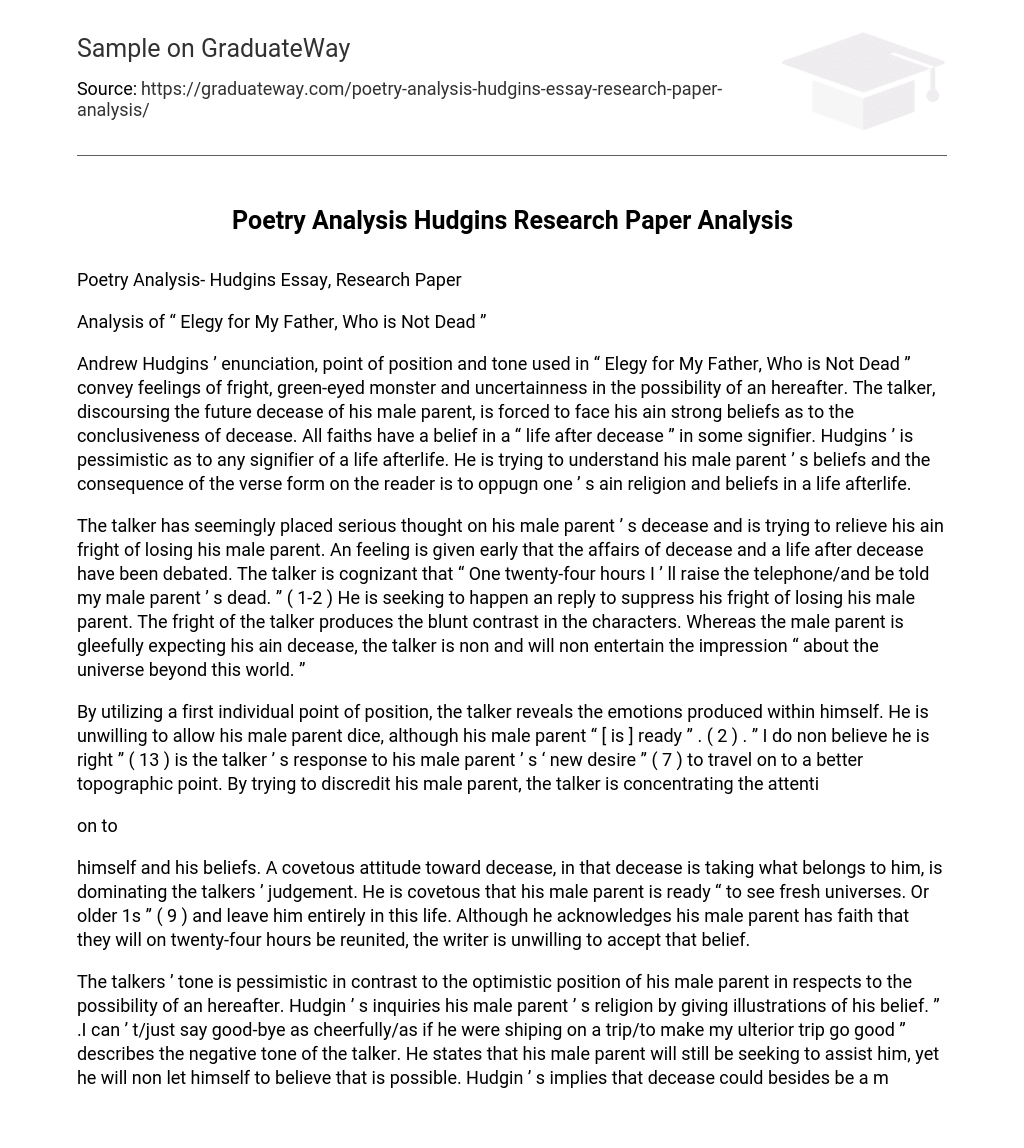Andrew Hudgins ’ enunciation, point of position and tone used in “ Elegy for My Father, Who is Not Dead ” convey feelings of fright, green-eyed monster and uncertainness in the possibility of an hereafter. The talker, discoursing the future decease of his male parent, is forced to face his ain strong beliefs as to the conclusiveness of decease. All faiths have a belief in a “ life after decease ” in some signifier. Hudgins ’ is pessimistic as to any signifier of a life afterlife. He is trying to understand his male parent ’ s beliefs and the consequence of the verse form on the reader is to oppugn one ’ s ain religion and beliefs in a life afterlife.
The talker has seemingly placed serious thought on his male parent ’ s decease and is trying to relieve his ain fright of losing his male parent. An feeling is given early that the affairs of decease and a life after decease have been debated. The talker is cognizant that “ One twenty-four hours I ’ ll raise the telephone/and be told my male parent ’ s dead. ” ( 1-2 )
He is seeking to happen an reply to suppress his fright of losing his male parent. The fright of the talker produces the blunt contrast in the characters. Whereas the male parent is gleefully expecting his ain decease, the talker is non and will non entertain the impression “ about the universe beyond this world. ”
By utilizing a first individual point of position, the talker reveals the emotions produced within himself. He is unwilling to allow his male parent dice, although his male parent “ [ is ] ready ” . ( 2 ) . ” I do non believe he is right ” ( 13 ) is the talker ’ s response to his male parent ’ s ‘ new desire ” ( 7 ) to travel on to a better topographic point. By trying to discredit his male parent, the talker is concentrating the attenti on to himself and his beliefs.
A covetous attitude toward decease, in that decease is taking what belongs to him, is dominating the talkers ’ judgement. He is covetous that his male parent is ready “ to see fresh universes. Or older 1s ” ( 9 ) and leave him entirely in this life. Although he acknowledges his male parent has faith that they will on twenty-four hours be reunited, the writer is unwilling to accept that belief.
The talkers ’ tone is pessimistic in contrast to the optimistic position of his male parent in respects to the possibility of an hereafter. Hudgin ’ s inquiries his male parent ’ s religion by giving illustrations of his belief. ” .I can ’ t/just say good-bye as cheerfully/as if he were shiping on a trip/to make my ulterior trip go good ” describes the negative tone of the talker.
He states that his male parent will still be seeking to assist him, yet he will non let himself to believe that is possible. Hudgin ’ s implies that decease could besides be a metempsychosis in that “ [ his male parent will ] wrap me in his weaponries and laugh/the manner he did when I arrived ” . One wonders if the talker is non seeking to convert himself of the possibility of a life afterlife.
The talker views decease as an terminal by utilizing the metaphor “ his ship ’ s gone down “ , ( 19 ) whereas his male parent positions decease as a new beginning for he and his boy. When the talker inquiries the uncertainness of life afterlife, he produces an chance for the reader to reflect and seek his ain beliefs.
Each individual, irrespective of his race, nationality or fiscal position, will some twenty-four hours face decease and the possibility of an hereafter. Hudgins entices each of us to seek our ain beliefs and decide the affair in our ain religion. Shall we look at decease as an terminal or as a beginning of a new journey?





